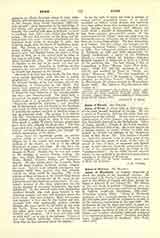

Adam of Murimuth, an English chronicler of about the middle of the fourteenth century. He was a canon of St. Paul’s, London, and took an active part in the affairs of Church and State during the reigns of Edward II and Edward III. His history of his own times is entitled “Chronicon, sive res gestae sui temporis quibus ipse interfuit, res Romanas et Gallicas Anglicanis intertexens, 1302-1343” (Cottonian Library MSS.). “Adam of Murimuth continues to be a principal witness for events up to the year 1346, after which the narrative is carried on by his unknown continuator to the year 1380. His statements are for the most part made on good authority, or as the result of personal observation, and the impression we derive is that of one who was an honest and veracious chronicler, although possessed of no descriptive literary power” [Gardiner and Mullinger, “English History for Students” (New York, 1881),284].
THOMAS WALSH

